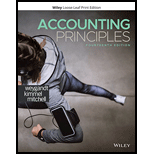
Concept explainers
Accounting for Receivables:
Receivables are defined as the amounts that are due to a firm by its customers and other parties. Receivables include all those assets that arise due to the primary operations of a firm and those representing cash that is to be collected from all external parties who owe money to the firm.
Receivables are broadly categorized into trade-receivables and non-trade receivables. Trade receivables refer to those receivables that occur due to the sale of goods and services in the normal course of business. Non-trade receivables refer to the amounts that occur due to third parties from transactions outside the primary course of business.
To indicate: Whether the receivables are reported as
Want to see the full answer?
Check out a sample textbook solution
Chapter 9 Solutions
ACCT.PRINCIPLES (LL)
- Zebrix Ltd. has an inventory period of 55 days, an accounts receivable period of 10 days, and an accounts payable period of 6 days. The company's annual sales are $208,400. How many times per year does the company turn over its accounts receivable?arrow_forwardLika company issues 2,000 shares of $10 par value common stock for $25 per share. What amount should be credited to the Common Stock account and to the Additional Paid-in Capital account?arrow_forwardCan you help me solve this general accounting question using the correct accounting procedures?arrow_forward
- Can you solve this general accounting question with accurate accounting calculations?arrow_forwardPlease provide the correct answer to this general accounting problem using accurate calculations.arrow_forwardI need help solving this general accounting question with the proper methodology.arrow_forward
- I need help finding the accurate solution to this general accounting problem with valid methods.arrow_forwardPlease provide the answer to this financial accounting question using the right approach.arrow_forwardCan you explain this general accounting question using accurate calculation methods?arrow_forward
- Can you solve this financial accounting problem using accurate calculation methods?arrow_forwardPlease explain the solution to this general accounting problem with accurate principles.arrow_forwardI am looking for a reliable way to solve this financial accounting problem using accurate principles.arrow_forward

 AccountingAccountingISBN:9781337272094Author:WARREN, Carl S., Reeve, James M., Duchac, Jonathan E.Publisher:Cengage Learning,
AccountingAccountingISBN:9781337272094Author:WARREN, Carl S., Reeve, James M., Duchac, Jonathan E.Publisher:Cengage Learning, Accounting Information SystemsAccountingISBN:9781337619202Author:Hall, James A.Publisher:Cengage Learning,
Accounting Information SystemsAccountingISBN:9781337619202Author:Hall, James A.Publisher:Cengage Learning, Horngren's Cost Accounting: A Managerial Emphasis...AccountingISBN:9780134475585Author:Srikant M. Datar, Madhav V. RajanPublisher:PEARSON
Horngren's Cost Accounting: A Managerial Emphasis...AccountingISBN:9780134475585Author:Srikant M. Datar, Madhav V. RajanPublisher:PEARSON Intermediate AccountingAccountingISBN:9781259722660Author:J. David Spiceland, Mark W. Nelson, Wayne M ThomasPublisher:McGraw-Hill Education
Intermediate AccountingAccountingISBN:9781259722660Author:J. David Spiceland, Mark W. Nelson, Wayne M ThomasPublisher:McGraw-Hill Education Financial and Managerial AccountingAccountingISBN:9781259726705Author:John J Wild, Ken W. Shaw, Barbara Chiappetta Fundamental Accounting PrinciplesPublisher:McGraw-Hill Education
Financial and Managerial AccountingAccountingISBN:9781259726705Author:John J Wild, Ken W. Shaw, Barbara Chiappetta Fundamental Accounting PrinciplesPublisher:McGraw-Hill Education





